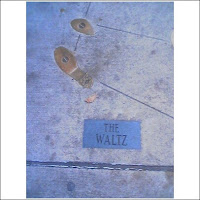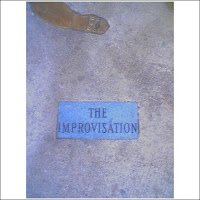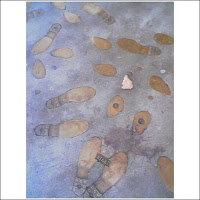I didn’t grow up observing Advent, only Christmas. Even then the time was short: I have a December birthday, so my mother made a point not to put up the decorations until after my birth had been duly celebrated; my father liked the decorations to come down the day after Christmas, so the whole thing lasted about two weeks at our house. Short and sweet. As far as church went, no Advent observance meant December was the Christmas season, every service filled with carols as we worked our way to the manger.
My first real experience with Advent was through Episcopal friends when I was living in Fort Worth. One was the youth minister at the nearest Episcopal church and the other was one of the young people in my youth group who was from an Episcopal family. I remember going to the midnight service on Christmas Eve at All Saints Episcopal Church, with all the smells and bells, and being seated on the aisle at the exact point where the young man with the big ball of incense took it full circle and gave me a snoot full of scented smoke. I sneezed and cried the rest of the service. I’ve been an Advent fan ever since.
I love the intentional preparation, the meaningful repetition of the rituals, the lighting of the candles, all of it. And I sorely miss the Christmas carols. I know we get to sing them during Christmastide as we wait for the wise men to finally make it across the desert, but I miss singing them now, while we are waiting. I miss them because those songs are a good bit of what helps me to prepare, rather than just wait, and I feel like we’re unwittingly giving over the Christmas music to the malls and radio stations since we aren’t singing them in worship. I need someone other than Karen Carpenter to get me to Christmas.
greeting cards have all been sent
the Christmas rush is through
I just have one wish to make
a special one for you . . .
One of the things we have not done yet in our new place is put up a tree. We, like Mary and Joseph, I suppose, are in transition. We are renting a house here waiting for someone to buy or rent our house back in Marshfield so we can find our way to more permanent housing after the first of the year. We’ve worked hard to only unpack the basic things we need since we are going to have to repack it all in the Pod to move it to wherever it goes next. When we were filling it up in Massachusetts, we worked hard to pack in an order that would let us get to our most necessary things and our Christmas decorations were some of those essentials. When we got home from church this afternoon, I said to Ginger, “I’m going to find a tree. I can’t go any longer without a tree.”
“Thank you,” she said. “I can’t either.
Neither of us last long, sinus wise, in a house with a real tree, so I headed for the various big box stores around us to find an artificial one since we gave the our old one to the Marshfield Church before we left. I really haven’t been in stores much this season (I’m an online shopper) and was quite startled by the crowds and parking difficulties on a Sunday afternoon. I finally found our tree (pre-lit!) and assembled it in the living room in front of the window so our neighbors could see we were into the swing of the season. The lights have a built in twinkle to them and they warm up the house quite nicely. The will burn from now until the Magi arrive.
As I went about my Christmas tasks, I kept thinking about carols. As I put up the tree, I opened iTunes to see what Christmas music I had since the Christmas CDs are still in the Pod somewhere. The only full album I had was Bruce Cockburn’s Christmas. Just before the end of the record, he started to sing my favorite:
It came upon the midnight clear,
That glorious song of old,
From angels bending near the earth,
To touch their harps of gold:
“Peace on the earth, goodwill to men,
From heaven’s all-gracious King.”
The world in solemn stillness lay,
To hear the angels sing.
I know one of the reasons I find such meaning in the carol is the images of darkness juxtaposed with hope have been deeply resonant as I have learned to live with depression. The song speaks, for me, to what I want to happen in and to my heart during Advent.
Still through the cloven skies they come,
With peaceful wings unfurled,
And still their heavenly music floats
O’er all the weary world;
Above its sad and lowly plains,
They bend on hovering wing,
And ever o’er its Babel sounds
The blessèd angels sing.
I did learn there is a verse that is omitted from most hymnals that would be worth singing this year. at least.
Yet with the woes of sin and strife
The world has suffered long;
Beneath the angel-strain have rolled
Two thousand years of wrong;
And man, at war with man, hears not
The love-song which they bring;
O hush the noise, ye men of strife,
And hear the angels sing.
One verse, in particular, touches me the most.
And ye, beneath life’s crushing load,
Whose forms are bending low,
Who toil along the climbing way
With painful steps and slow,
Look now! for glad and golden hours
come swiftly on the wing.
O rest beside the weary road,
And hear the angels sing!
How can we wait to sing these words? How can we keep from singing? We know the song we all need to hear.
For lo!, the days are hastening on,
By prophet bards foretold,
When with the ever-encircling years
Comes round the age of gold
When peace shall over all the earth
Its ancient splendors fling,
And the whole world send back the song
Which now the angels sing.
I can wait for Christmas, but I need to sing now. Can’t we start caroling?
Peace,
Milton
P. S. – I couldn’t find Cockburn’s version to share, but here is a beautiful offering by Catie Curtis.








